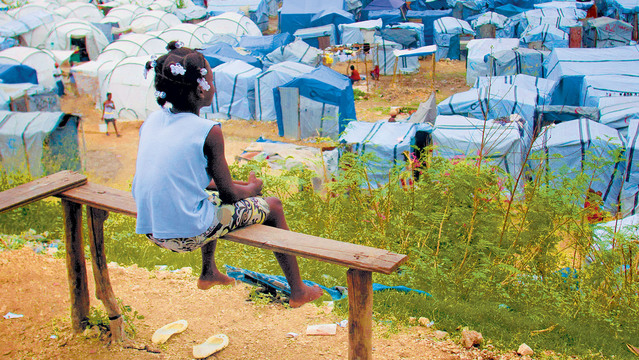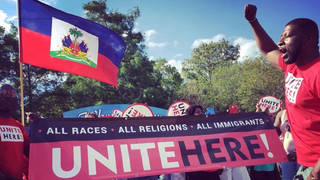
Related
Topics
Read an excerpt from the new book by Jonathan Katz, who will be on Democracy Now! Friday to discuss the aftermath of a the January 12, 2010, earthquake in which a quarter of a million people died. In The Big Truck That Went By: How the World Came to Save Haiti and Left Behind a Disaster, Katz explores the controversial claim that Western aid to Haiti is not always well intentioned. Katz was the only full time U.S. correspondent in Haiti when the earthquake hit, and remained there for another year to document how ordinary Haitians fared in the aftermath, and the progress of the international effort to rebuild.
Click here to see past Haiti coverage on Democracy Now!
From “The Big Truck That Went By,” by Jonathan M. Katz. Copyright © 2013 by the author and reprinted by permission of Palgrave Macmillan, a division of Macmillan Publishers Ltd.
Introduction
“Why Haiti?” Hillary Rodham Clinton asked in early 2010, speaking on behalf of a bewildered world. The earthquake that leveled Port-au-Prince and much of southern Haiti had defied logic, imagination, even superstition. How did a magnitude 7.0 temblor—a huge release of energy, but not necessarily catastrophic—prove to be the deadliest natural disaster ever recorded in the Western Hemisphere? Why did an earthquake, of all calamities, strike at the heart of a nation already reeling from so many others? And why, three years after so many countries and ordinary people sent money and help, hasn’t Haiti gotten better?
I wrote this book in part to answer those questions. When the earthquake struck, I had been living in Haiti for two and a half years. I had already seen a lifetime’s worth of disasters, both political and natural. Two centuries of turmoil and foreign meddling had left a Haitian state so anemic it couldn’t even count how many citizens it had. Millions were packed in and around the nation’s capital, living in poorly made buildings stacked atop a fault line. People could not rely on police, a fire department, or schools. Even the rat-infested General Hospital charged so much for basic medicine that few Haitians could afford care. Nearly everything—water, gas for generators, hungry relatives from the countryside—was delivered by truck. Each day, big eighteen-wheelers rumbled down the narrow streets, shaking homes as they passed. When the shockwave surged through Port-au-Prince, just fifteen miles from the epicenter, many of us thought at first that it was a gwo machin, a big truck, going by.
I wanted to understand how people could endure not only the catastrophe that befell Haiti on January 12, 2010, but also the hardship and absurdity that followed. The aid response was marked by the best intentions: an international outpouring for Port-au-Prince, Carrefour, Jacmel, Léogâne, and other cities in the disaster zone. The numbers were astounding: The world spent more than $5.2 billion on the emergency relief effort; private donations reached $1.4 billion in the United States alone.1 Thousands of doctors and nurses performed lifesaving surgeries. When it came time to plan for the future, governments pledged about $10 billion more for Haiti’s recovery and reconstruction, promising to build a better, safer, more prosperous Haiti than before. “We need Haiti to succeed,” Hillary Clinton told a donors’ conference, as she answered her own question. “What happens there has repercussions far beyond its borders.”2
But today, Haiti is not better off. It ended its year of earthquakes with three new crises: nearly a million people still homeless; political riots fueled by frustration over the stalled reconstruction; and the worst cholera epidemic in recent history, likely caused by the very UN soldiers sent to Haiti to protect its people (that story, and my investigation, appear later in the book). Those few who were fortunate enough to leave post-quake camps—an estimated 400,000 still lived under tarps as of mid-2012—usually settled in houses no safer than the ones that collapsed in the earthquake. Though by the time you read this book, the ruins of the devastated National Palace might finally have been cleared, rubble, some mixed with human remains, still chokes much of the city. At last count, more than half the reconstruction money that was supposed to be delivered as of 2011 remains an unfulfilled promise. For many of my Haitian friends, some of whom you’ll meet in this book, the legacy of the response has been a sense of betrayal.
I wanted to write this book to understand how a massive humanitarian effort, led by the most powerful nation in the world—my country—could cause so much harm and heartache in another that wanted its help so badly. The United States and Haiti have long had a special relationship, though not an easy one. Founded only decades apart, the first republic in the Western Hemisphere at first refused to recognize the second, then brutally occupied it, and finally spent decades meddling in its affairs. The extreme centralization of people and services in Haiti’s capital, Port-au-Prince, which proved so deadly in the earthquake, was in large part a legacy of U.S. policy and actions.
But Haitians admire the American people, and many dream of coming here one day. Haitian Americans have prospered and play major roles in American life while sustaining millions on the island with money sent back (remittances make up more than a quarter of the Haitian economy).3 Many Americans, meanwhile, are fascinated by a close neighbor whose apparent poverty and dysfunction can be used to affirm our wealth and strength, where good deeds can be performed and theories tested, framed by a culture of Vodou and zombies that entices the imagination. Several officials I talked to for this book spoke of a widely held “romanticism” of the black republic among their colleagues.
One of Hillary Clinton’s first acts as secretary of state was to order a review of U.S. policy toward Haiti. That review was finished on the afternoon of January 12, 2010, barely an hour before the earthquake struck.4 The Americans shifted focus quickly and led the response, providing the largest sums of money and huge numbers of personnel—22,000 U.S. troops alone at the height. In many ways, the response’s legacy, good and bad, is an American legacy. We owe it to ourselves to find out what happened.
It’s worth considering Haiti also because of what its experience means for all of us. We are living in a time of record-setting hurricane seasons, droughts, wildfires, blizzards, earthquake clusters, and disease, many reaching places that long ago thought they had developed their way out of trouble. In 2010, natural disasters cost $123 billion and affected 300 million people.5 Understanding how to deal with these crises in the future means understanding what has been done so far. Rescue workers, officials—and, yes, journalists—still approach crises unprepared to think beyond the hoary, illogical clichés that gird disaster response. For instance, that people will panic, riot, or turn on each other after a disaster; typically, they don’t. Or that in fashioning solutions to disasters, doing something is always better than doing nothing, no matter how poorly thought-out it is; it’s not. And, for anyone who gave money to a major aid group, that they were going to be able to spend your $20 donation










